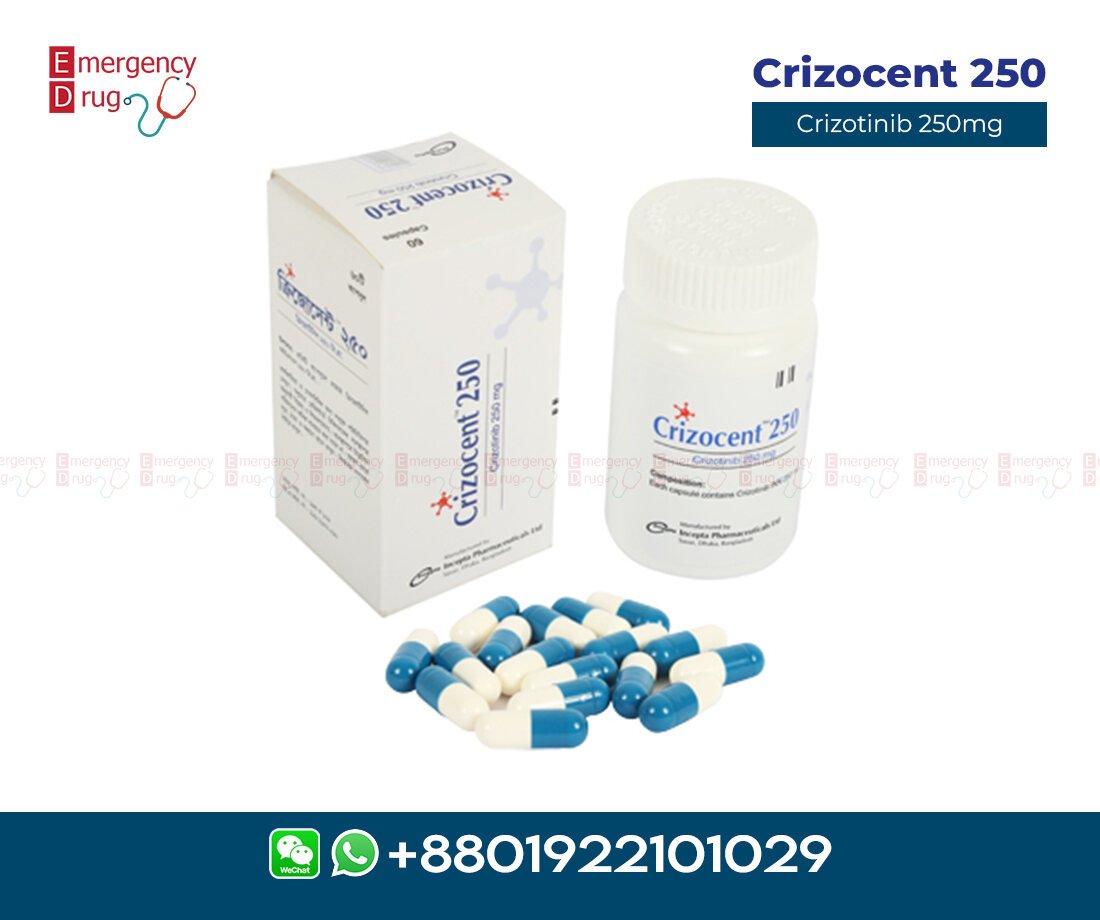Crizotinib
Crizotinib
Showing all 3 results
Crizotinib Drug
Indication
Crizotinib is a targeted cancer therapy drug used primarily to treat certain types of non-small cell lung cancer (NSCLC). It is an inhibitor of the anaplastic lymphoma kinase (ALK), c-ros oncogene 1 (ROS1), and hepatocyte growth factor receptor (c-MET) tyrosine kinases.
Crizotinib Drug used for:
- Metastatic Non-Small Cell Lung Cancer (NSCLC): This type of lung cancer has spread to other parts of the body and has a specific genetic marker known as ALK-positive.
- Relapsed or Refractory Systemic Anaplastic Large Cell Lymphoma (ALCL): This is a type of blood cancer that has either come back after treatment or has not responded to previous treatments, and it is also ALK-positive.
- Unresectable, Recurrent, or Refractory Inflammatory Myofibroblastic Tumors (IMT): This includes cases where the tumors cannot be surgically removed, have returned after treatment, or did not respond to previous treatments and are ALK-positive.
Crizotinib FDA Approval
In August 2011, the US Food and Drug Administration (FDA) approved crizotinib for the treatment of certain late-stage (locally advanced or metastatic) non-small cell lung cancers (NSCLC) that have the abnormal ALK gene. This approval included the requirement for a companion molecular test to detect the EML4-ALK fusion gene.
In March 2016, the FDA also approved crizotinib for treating ROS1-positive NSCLC.
In October 2012, the European Medicines Agency (EMA) approved crizotinib for treating NSCLC that has the abnormal ALK gene.
Mechanism of Action
Crizotinib is a medication used to treat certain types of cancer, particularly lung cancer. Let’s break down how it works in simple terms:
Understanding Cancer Growth: Cancer cells grow and spread by signaling pathways, which are like communication networks within the cells. These pathways tell the cells to divide and grow uncontrollably.
Role of ALK and ROS1 Proteins: In some types of lung cancer, there are specific genetic changes that lead to the production of abnormal proteins called ALK (Anaplastic Lymphoma Kinase) and ROS1 (c-ros oncogene 1). These proteins can activate signaling pathways that drive cancer growth.
How does Crizotinib Works: Crizotinib is a type of drug known as a tyrosine kinase inhibitor (TKI). It works by specifically targeting and blocking the activity of ALK and ROS1 proteins. Think of crizotinib as a switch that turns off the signaling pathways that promote cancer growth.
Halting Cancer Progression: By inhibiting ALK and ROS1 proteins, crizotinib stops the cancer cells from receiving the signals they need to grow and divide. This helps to slow down or even stop the progression of the cancer.
Targeted Treatment: Crizotinib is considered a targeted therapy because it specifically targets the genetic changes that drive cancer growth in certain patients. This means it can be more effective and have fewer side effects compared to traditional chemotherapy, which affects all rapidly dividing cells in the body.
In summary, Crizotinib works by targeting and inhibiting the abnormal ALK and ROS1 proteins that drive cancer growth in certain types of lung cancer. By blocking these proteins, Crizotinib helps to halt the progression of the cancer and improve outcomes for patients.
Crizotinib Side Effects
The most common adverse reactions (≥25%)
- Vision disorders
- Nausea
- Diarrhea
- Vomiting
- Edema
- Constipation
- Elevated transaminases
- Fatigue
- Decreased appetite
- Upper respiratory infection
- Dizziness
- Neuropathy
Serious Side Effects
Lung Problems: In some cases, this medicine can cause inflammation or scarring in the lungs, leading to symptoms like shortness of breath or cough.
Heart Issues: Can affect the electrical activity of the heart, leading to irregular heart rhythms or other heart problems.
Vision Loss: Rarely, crizotinib can cause severe vision problems or even loss of vision.
Severe Allergic Reactions: Some patients may experience severe allergic reactions to crizotinib, which can be life-threatening.
Dosage and Administration
Recommended dose: Crizotinib 250 mg twice daily. Take this medication with or without food. Swallow the medication whole with a glass of water, and do not crush, chew, or break the capsules or tablets unless advised otherwise.
Missed a Dose?
If a dose is missed, it should be taken as soon as remembered, unless it’s almost time for the next dose. In that case, the missed dose should be skipped, and the regular dosing schedule should be resumed. It’s crucial to never take a double dose to make up for a missed one. If there are any questions or concerns about the dosage or administration of the medication, it’s important to consult with a healthcare provider or pharmacist for clarification.



